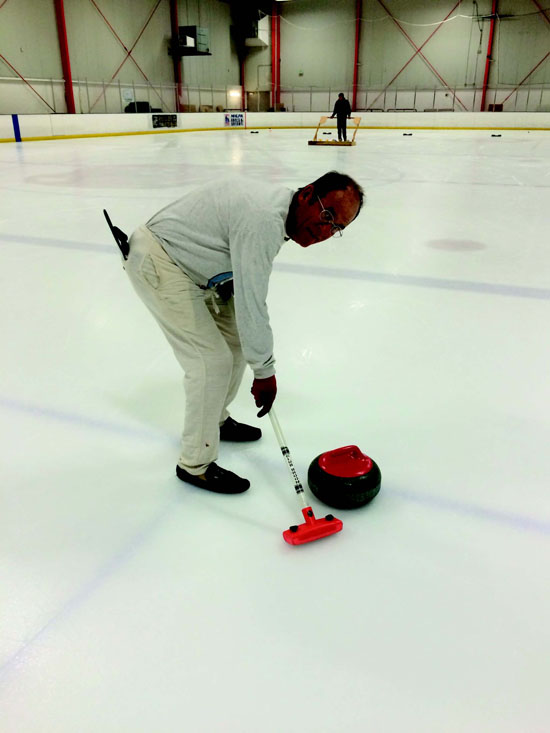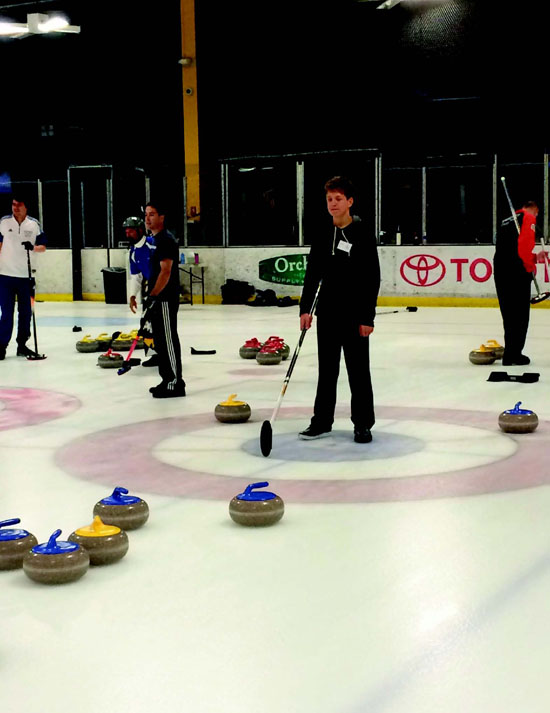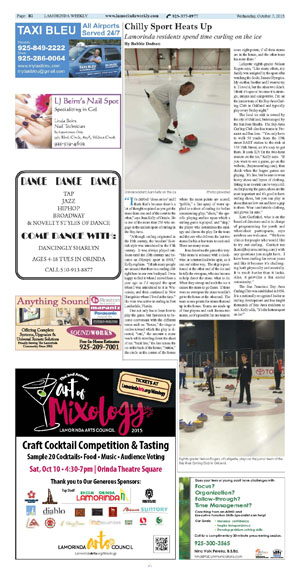|
|
Published October 7th, 2015
|
Chilly Sport Heats Up
|
| Lamorinda residents spend time curling on the ice |
| By Bobbie Dodson
|
 |
| Orinda resident Juan Kelly on the ice Photos provided |
"It's dubbed 'chess on ice' and I think that's because there's a lot of thought required as you get the stone from one end of the court to the other," says Juan Kelly of Orinda. He is one of the more than 250 who engage in the ancient sport of curling in the Bay Area.
 "Although curling originated in the 15th century, the 'modern' Scottish style was introduced in the 17th century. It was always played outdoors until the 20th century and became an Olympic sport in 1998," Kelly explains. "I think many people are amazed that there is a curling club right here in our own backyard. I was happy to find it when I moved here a year ago as I'd enjoyed the sport when I was introduced to it in Wisconsin, and then continued in New Hampshire where I lived at the time." He even was active in curling in Fort Lauderdale, Florida.
"Although curling originated in the 15th century, the 'modern' Scottish style was introduced in the 17th century. It was always played outdoors until the 20th century and became an Olympic sport in 1998," Kelly explains. "I think many people are amazed that there is a curling club right here in our own backyard. I was happy to find it when I moved here a year ago as I'd enjoyed the sport when I was introduced to it in Wisconsin, and then continued in New Hampshire where I lived at the time." He even was active in curling in Fort Lauderdale, Florida.
 One not only has to learn how to play the game, but first needs to become conversant with the different terms such as: "house," the rings or circles toward which the play is directed; "curl," the amount a stone bends while traveling down the sheet of ice; "back line," the line across the ice at the back of the house; "button," the circle at the center of the house where the most points are scored; "pebble," a fine spray of water applied to a sheet of curling ice before commencing play; "sheet," the specific playing surface upon which a curling game is played; and "skip," the player who determines the strategy and directs the play for the team and the one who delivers the last two stones for his or her team to each end. There are many more.
One not only has to learn how to play the game, but first needs to become conversant with the different terms such as: "house," the rings or circles toward which the play is directed; "curl," the amount a stone bends while traveling down the sheet of ice; "back line," the line across the ice at the back of the house; "button," the circle at the center of the house where the most points are scored; "pebble," a fine spray of water applied to a sheet of curling ice before commencing play; "sheet," the specific playing surface upon which a curling game is played; and "skip," the player who determines the strategy and directs the play for the team and the one who delivers the last two stones for his or her team to each end. There are many more.
 Juan describes the game this way: "The stone is released with a clockwise or counterclockwise spin, so it can curl either way. The skip is positioned at the other end of the ice and he tells the sweepers, who use brooms to help direct the stone, what to do. When they sweep and melt the ice it causes the stone to go faster. If there were no sweepers the stone wouldn't get to the house at the other end. The team scores points for stones that end up in the house. Teams are made up of four players and each throws two stones, so it's possible for one team to score eight points, if all their stones are in the house, and the other team has none there."
Juan describes the game this way: "The stone is released with a clockwise or counterclockwise spin, so it can curl either way. The skip is positioned at the other end of the ice and he tells the sweepers, who use brooms to help direct the stone, what to do. When they sweep and melt the ice it causes the stone to go faster. If there were no sweepers the stone wouldn't get to the house at the other end. The team scores points for stones that end up in the house. Teams are made up of four players and each throws two stones, so it's possible for one team to score eight points, if all their stones are in the house, and the other team has none there."
 Lafayette eighth-grader Nelson Rogers says, "Like many others, my family was intrigued by the sport after watching the Sochi, Russia Olympics. My mother, brother and I went to try it. I loved it, but the other two didn't. I think it's special because it is strategic, unique and competitive. I'm on the junior team of the Bay Area Curling Club in Oakland and typically play every Friday night."
Lafayette eighth-grader Nelson Rogers says, "Like many others, my family was intrigued by the sport after watching the Sochi, Russia Olympics. My mother, brother and I went to try it. I loved it, but the other two didn't. I think it's special because it is strategic, unique and competitive. I'm on the junior team of the Bay Area Curling Club in Oakland and typically play every Friday night."
 The local ice rink is owned by the city of Oakland, but managed by the San Jose Sharks. The Bay Area Curling Club also has teams in Fremont and San Jose. "You only have to walk 50 yards from the 19th street BART station to the rink at 519 18th Street, so it's easy to get there. It costs $25 for the two-hour session on the ice," Kelly says. "If you want to see a game, go on the website, (bayareacurling.com), then check when the league games are playing. It's free, but be sure to wear heavy shoes and layers of clothing. Sitting in an ice rink can be very cold. As for playing the game, shoes are the most important and it's good to have curling shoes, but you can play in shoes that are low cut and have a grip to them. Wear comfortable clothing, and gloves for sure."
The local ice rink is owned by the city of Oakland, but managed by the San Jose Sharks. The Bay Area Curling Club also has teams in Fremont and San Jose. "You only have to walk 50 yards from the 19th street BART station to the rink at 519 18th Street, so it's easy to get there. It costs $25 for the two-hour session on the ice," Kelly says. "If you want to see a game, go on the website, (bayareacurling.com), then check when the league games are playing. It's free, but be sure to wear heavy shoes and layers of clothing. Sitting in an ice rink can be very cold. As for playing the game, shoes are the most important and it's good to have curling shoes, but you can play in shoes that are low cut and have a grip to them. Wear comfortable clothing, and gloves for sure."
 Kate Garfinkel, who is on the board of directors and is in charge of programming for youth and wheelchair participants, says newbies are welcome. "We have clinics for people who would like to try out curling. Contact me (kate@bayareacurling.com) with any questions you might have. I have been curling for seven years and like it because it's challenging both physically and mentally. It is much harder than it looks. Also, it provides a fun social community."
Kate Garfinkel, who is on the board of directors and is in charge of programming for youth and wheelchair participants, says newbies are welcome. "We have clinics for people who would like to try out curling. Contact me (kate@bayareacurling.com) with any questions you might have. I have been curling for seven years and like it because it's challenging both physically and mentally. It is much harder than it looks. Also, it provides a fun social community."
 The San Francisco Bay Area Curling Club was established in 1958. It is a nationally recognized leader in curling development and has taught thousands of Bay Area residents to curl. Kelly adds, "It's the hottest sport on ice!"
The San Francisco Bay Area Curling Club was established in 1958. It is a nationally recognized leader in curling development and has taught thousands of Bay Area residents to curl. Kelly adds, "It's the hottest sport on ice!"

|
 |
| Eighth-grader Nelson Rogers, of Lafayette, plays on the junior team of the Bay Area Curling Club in Oakland. |
|
|
|
|
|
|
| |
|
|
|
|




